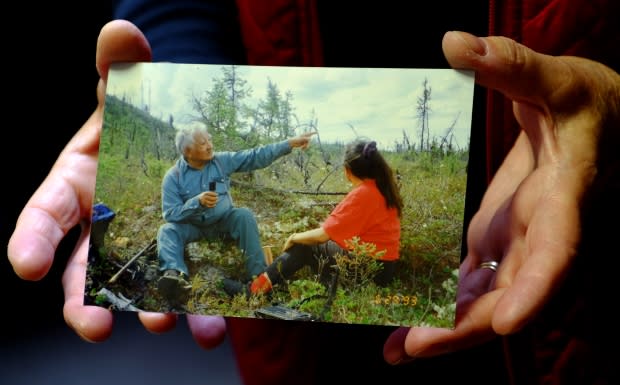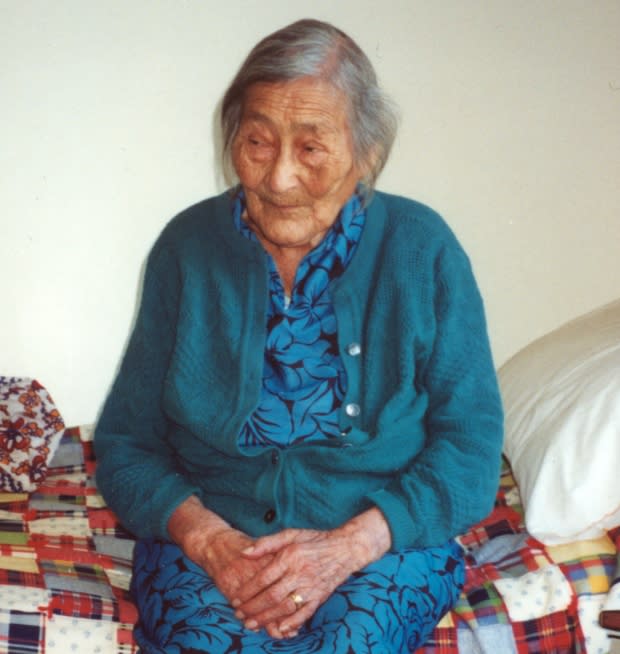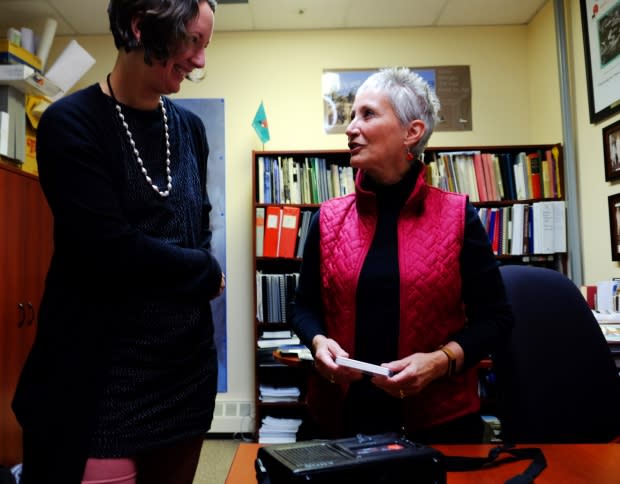'It's a priceless gift': Gwich'in Tribal Council donates records to N.W.T. Archives
Sarah Simon's voice comes through the battered tape recorder in Ingrid Kritsch's office in Yellowknife. The tape scratches as Simon begins speaking, recording a greeting for an old friend.
"I'm getting tired of sitting in one place, but the people have been so kind to me," Simon can be heard saying.
"I wonder if we'll see one another again. But still, I remember you in my prayers. Now and then you come into my mind and I pray for you. Take good care of yourself. Be a good old man."
Simon was 100 when Kritsch recorded her voice at the Inuvik hospital in 2001. The Gwich'in elder was a mainstay in her community of Fort McPherson as a minister and interpreter. The recording with Kritsch was one of the last she made before she died.
For years, the Gwich'in Tribal Council cared for that recording along with thousands of other research archives it amassed over 25 years. But now, the council's donated its collection to the territorial archive in Yellowknife to be catalogued and preserved.

"This is all about the people and their knowledge, their wisdom, their stories, their language, their culture. It's everything," Kritsch, the research director for the Gwich'in Tribal Council, explained.
"It's a priceless gift the elders have given to the coming generations. We want to make sure it's secure and shared."
Elders want their history shared
Kritsch has been working with Gwich'in for more than 25 years. She gathered much of the material with Alestine Andre and her father Hyacinthe Andre.
The archive includes documentation of traditional Gwich'in place names, stories of traditional land use, life histories from elders, Gwich'in legends and replicas of traditional Gwich'in material culture.
This is all about the people and their knowledge, their wisdom, their stories, their language, their culture. It's everything - Ingrid Kritsch, research director, Gwich'in Tribal Council
It's the record of what the Gwich'in Tribal Council's Social and Cultural Institute (now the tribal council's Department of Culture and Heritage) has accomplished.
More than 220 Gwich'in elders had been part of the research over the years with Andre and Kritsch. The elders were the ones who wanted everything to be documented and saved, Kritsch explained.

"That's the reason they worked with us, to share it," Kritsch said.
"They said to us, 'we're concerned this information is being lost, it's not being passed on," she said. "We want you to put it in a safe place so our grandchildren, our great-grandchildren, our great-great grandchildren can hear our voices and can learn from us."
The records are now in Yellowknife where they're being catalogued and stored. Eventually they will be available to the public and researchers working on Gwich'in history, explained Erin Suliak, the territorial archivist.
For Suliak, this research is special because it was produced by and with Gwich'in people, instead of researchers flying in and out of the North.
"As a Northerner, I think a lot of us can identify with the idea we've been studied by others. Perhaps those studies haven't always benefited [us]," she said. "When you have your own people reflecting on your own traditions and your own knowledge. The significance is there.
"You're doing it for yourself, you're doing it for your people and you're doing it for the generations to come," she said. "It's coming from you, it's coming from the heart. It's honouring your elders and your people to come."
After all the material in the collection has been archived and catalogued, territorial archivists will work with the Gwich'in Tribal Council to decide on how and when the archives will be displayed and released to the public, Suliak said.

Fires, floods real disaster risk
A massive fire earlier this month at Brazil's National Museum in Rio de Janeiro highlighted the importance of keeping records and archives safe.
That museum held Latin America's largest collection of historical and scientific artifacts. Museum officials had estimated as much as 90 per cent of the collection burned and was lost.
Earlier this year, a fire at an Inuvik warehouse burned some publications produced by the Gwich'in Tribal Council put into perspective just how easy it would be for something similar to happen here.
Before the move to the territorial archives, material was stored in different warehouses and offices without any additional protection, Kritsch said.
"To hear that a warehouse we thought was relatively secure burned down, it was very sad," she said "It's hard to recreate things in some cases. That's why we're happy the original material is heading to the archives for the future."

